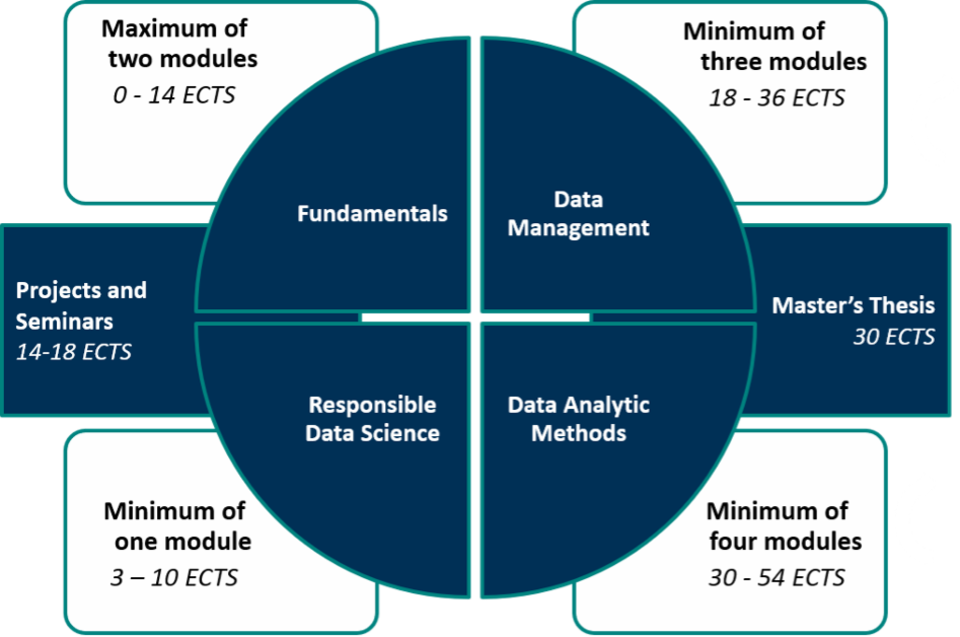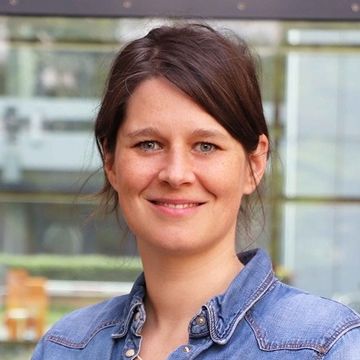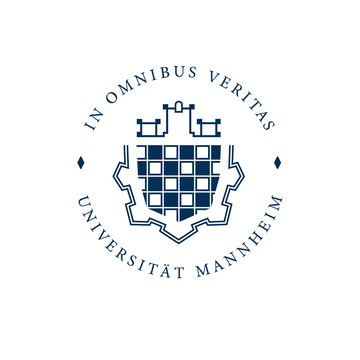Mannheim Master in Data Science
This page provides information for students enrolled in the Mannheim Master in Data Science. If you are a prospective student interested in the program, you can find general information about the master’s program here or on the website of the university.
Degree plans and course schedules
The Mannheim Master in Data Science (MMDS) program equips students with the knowledge and skills necessary to gain operational insight into large and complex datasets. It covers six major areas: Fundamentals, Data Management, Data Analytics, Responsible Data Science, Projects and Seminars, and the Master’s Thesis.
Fundamentals (0 – 14 ECTS)
The goal of the Fundamentals area is to align the different knowledge students acquired in their previous degree programs. Graduates of computer science and mathematics programs will acquire the knowledge required in empirical research (in particular, data collection and multivariate statistics). Graduates of social sciences programs and other fields will acquire the knowledge required in computer science (in particular, programming and database technology).
Data Management (18 – 36 ECTS)
One of the central challenges in the Big Data area is to handle the enormous amount, speed, heterogeneity, and quality of the data collected in industry, the public sector, and science. The Data Management area covers methods and concepts for obtaining, storing, integrating, managing, querying, and processing large amounts of data. The area includes courses on modern data management technology (such as parallel database systems, Spark, and NoSQL databases), data integration, information retrieval and search, software engineering, and algorithms.
Data Analytics (30 – 54 ECTS)
The Data Analytics area forms the core of the study program. It provides courses ranging from data mining, machine learning, and decision support, over text analytics and natural language processing, to advanced social science methods such as cross-sectional and longitudinal data analysis. The range of methodological courses is enhanced by courses on optimization, visualization, mathematics and information, and algebraic statistics.
Responsible Data Science (3 – 10 ECTS)There are great concerns about the use of data. A variety of stakeholders are increasingly becoming concerned about the irresponsible use of data. Within this field, students study data science techniques, infrastructures and approaches in order to make them more responsible.
Projects and Seminars (14 – 18 ECTS)
The Projects and Seminars area introduces students to independent research and teaches the skills necessary to successfully participate in and contribute to larger data science projects. The area consists of research seminars, individual projects, team projects. The projects are conducted jointly with industrial partners and/
or support ongoing research efforts of participating institutes. Master’s Thesis (30 ECTS)
In the master’s thesis, students apply what they learned throughout the program. The master’s thesis is written over a period of six months. Students are encouraged to write their thesis either in the context of research projects conducted by participating institutes or in cooperation with an industrial partner. Students often write their master’s thesis in cooperation with a company from the MMDS Industry Partner Network.

Course schedule
Examination regulations and module catalog
The module catalog 2023/
2024 (and Appendix) gives an overview of the course and contents of the program. Please read the examination regulations of your program carefully.
Examination committee
Chairman
 Bild: Nikoletta Babynets
Bild: Nikoletta BabynetsStudent representative: Alexander Haberling
You can contact the examination committee via pruefungsausschuss.wimuni-mannheim.de
Tasks of the central examination committee
We are responsible for the following topics:
- Advice on examination regulations
- Advice on module changes
- Advice in individual cases (such as extension of deadlines)
- Approval of reasons for withdrawal or delay
- Extension of examination deadlines
- Serious cases of cheating and breaches of regulations
- Determination of definitive failure with no option to re-sit
- Identification of missed deadlines
- Invalidity of examinations
- Appeal procedure
- Recognition of coursework and examinations
- Semester recognition certificates for BAföG, form 5 according to § 48 BAföG (also for LAG WPO)
 Bild: Emilie Orgler
Bild: Emilie OrglerAdvisory service
The student advisory (run by the study coach and program manager) is a combined offer for the Mannheim Master in Data Science program.
You can consult us in questions regarding:
- the study program
- the module catalog
- the examination regulations
- cases of hardship
- questions about module changes
- course contents
- your degree plan (modules, tracks, thesis)
You can contact the advisory service via studienberatung.wimuni-mannheim.de.
 Bild: Emilie Orgler
Bild: Emilie Orgler Bild: Emilie Orgler
Bild: Emilie Orgler
Master's thesis
Finding a supervisor and a topic for your master’s thesis requires early planning and initiative on your part. It is primarily your responsibility as a student to contact a chair that fits your study profile. This means that you need to contact several chairs or professors on your own initiative in order to find someone who will agree to supervise your master's thesis. It is the norm that students contact the chairs personally, and something we expect from students at our school.
Who can supervise my master's thesis?
In general, all professors teaching courses in the MMDS program also supervise master’s theses. However, professors from other schools and departments may also do so, provided the topic falls within the scope of the MMDS program.
Industry Partner Network
MMDS students often write their master’s thesis in cooperation with a company from the MMDS Industry Partner Network.




